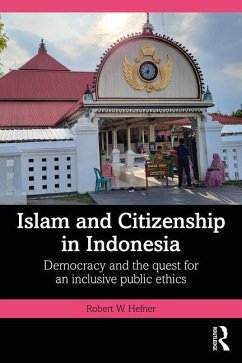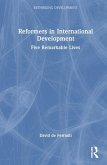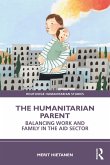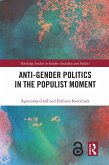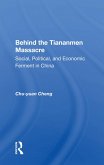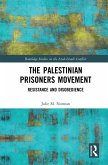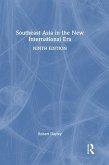This book examines the conditions facilitating democracy, women's rights, and inclusive citizenship in Indonesia, the most populous Muslim majority country and the third largest democracy in the world. It will be of interest to the general reader with an interest in Islam, citizenship, and democracy.
Hinweis: Dieser Artikel kann nur an eine deutsche Lieferadresse ausgeliefert werden.
Hinweis: Dieser Artikel kann nur an eine deutsche Lieferadresse ausgeliefert werden.
"This book will be a standard reference for any future work on Islam and democracy in Indonesia or comparatively across the Muslim world. It is a culmination of more than two decades of work and experience addressing Islam, democratic politics, and society in Indonesia."
- Vedi Hadiz, University of Melbourne, Australia
"Robert W. Hefner is the leading scholar of Islam and democracy in Indonesia - the demographically largest and intellectually most vibrant Muslim-majority country. This book will be considered as Hefner's magnum opus - a culmination of his half-a-century-long examination of diverse religious views and practices as well as their political implications in Indonesia's rural and urban settings. Islam and Citizenship analyzes the complex relations between Muslim politics, democracy, and public ethics with a nuanced attention to the Indonesian context while also providing insights for the rest of the Muslim world. It masterfully covers contested issues such as sharia, gender relations, and education. This groundbreaking book will shape the field of religion and politics for many years to come."
- Ahmet T. Kuru, San Diego State University, USA. Author of Islam, Authoritarianism, and Underdevelopment: A Global and Historical Comparison
"Hefner's book puts Muslims at the center of the study of Islam in Indonesia, which he describes as having a 'complex and agonistic plurality'. This is a welcome intervention in contemporary commentary on Islam and politics, taking readers on a multisited and multidimensional journey. Deploying an erudite lens that combines his ethnographic vision with comparative politics and sociology, he finds a concern with shared ideas of public ethics at the heart of contemporary contestations in the Muslim public sphere. Care of the social emerges as a key element accounting for the tenaciousness of Indonesian democracy, in the face of the conservative turn."
- Kathryn Robinson, The Australian National University
"This book manuscript - a magnum opus by arguably the most esteemed scholar of Islam in Indonesia and among the keenest thinkers on Islam, democracy, and comparative political philosophy more generally - is destined to be a classic. The depth of socio-historical knowledge of Indonesia, matched with an impressive engagement with an incredible range of social science theorists in anthropology, political science, and elsewhere, results in a complex portrait of religious politics a quarter century after the downfall of Suharto's authoritarian regime."
- James B. Hoesterey, Emory University, USA
- Vedi Hadiz, University of Melbourne, Australia
"Robert W. Hefner is the leading scholar of Islam and democracy in Indonesia - the demographically largest and intellectually most vibrant Muslim-majority country. This book will be considered as Hefner's magnum opus - a culmination of his half-a-century-long examination of diverse religious views and practices as well as their political implications in Indonesia's rural and urban settings. Islam and Citizenship analyzes the complex relations between Muslim politics, democracy, and public ethics with a nuanced attention to the Indonesian context while also providing insights for the rest of the Muslim world. It masterfully covers contested issues such as sharia, gender relations, and education. This groundbreaking book will shape the field of religion and politics for many years to come."
- Ahmet T. Kuru, San Diego State University, USA. Author of Islam, Authoritarianism, and Underdevelopment: A Global and Historical Comparison
"Hefner's book puts Muslims at the center of the study of Islam in Indonesia, which he describes as having a 'complex and agonistic plurality'. This is a welcome intervention in contemporary commentary on Islam and politics, taking readers on a multisited and multidimensional journey. Deploying an erudite lens that combines his ethnographic vision with comparative politics and sociology, he finds a concern with shared ideas of public ethics at the heart of contemporary contestations in the Muslim public sphere. Care of the social emerges as a key element accounting for the tenaciousness of Indonesian democracy, in the face of the conservative turn."
- Kathryn Robinson, The Australian National University
"This book manuscript - a magnum opus by arguably the most esteemed scholar of Islam in Indonesia and among the keenest thinkers on Islam, democracy, and comparative political philosophy more generally - is destined to be a classic. The depth of socio-historical knowledge of Indonesia, matched with an impressive engagement with an incredible range of social science theorists in anthropology, political science, and elsewhere, results in a complex portrait of religious politics a quarter century after the downfall of Suharto's authoritarian regime."
- James B. Hoesterey, Emory University, USA

